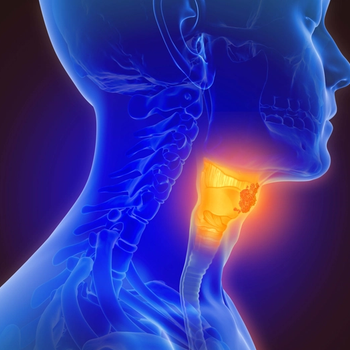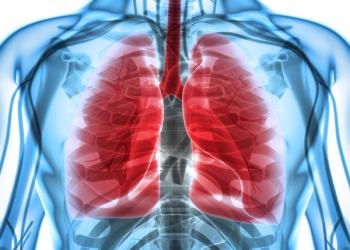
Gene Alterations May Predict Ribociclib Responses in Advanced Breast Cancer
ERBB2, FAT3, and FRS2 alterations appear to correlate with improved progression-free survival with ribociclib compared with placebo in patients with advanced breast cancer.
A circulating tumor DNA (ctDNA) analysis highlighted genomic biomarkers that potentially confer improved responses with or resistance to treatment with ribociclib (Kisqali) in patients with advanced breast cancer, according to findings from a pooled biomarker dataset published in Annals of Oncology.
Genetic alterations in ERBB2, FAT3, FRS2, MDM2, SFRP1, and ZNF217 were found to correlate with poor responses to placebo and added clinical benefits with ribociclib. Additionally, FRS2 alterations conferred high sensitivity to ribociclib therapy (P = .0714), as did MDM2 alterations (P = .0159). A higher reduction in disease progression with ribociclib vs placebo occurred among those with co-amplified FRS2/MDM2 alterations (HR, 0.23; 95% CI, 0.11-0.51; P = .0255).
The median progression-free survival (PFS) was 10.5 months with ribociclib vs 7.4 months with placebo in patients with ANO1 alterations, which investigators noted as a limited benefit with the former (HR, 0.78; 95% CI, 0.53-1.16; P = .0749). Investigators highlighted a median PFS of 6.5 months vs 9.2 months with each respective therapy in patients with CDKN2A/B/C alterations (HR, 1.20; 95% CI, 0.50-2.88; P = .0874).
In those with RB1 alterations, the median PFS was 3.8 months and 9.2 months with ribociclib vs placebo, respectively (HR, 1.48; 95% CI, 0.65-3.38). For those with wild-type RB1, the median PFS was 18.9 months vs 11.1 months (HR, 0.56; 95% CI, 0.47-0.66).
“This analysis identified biomarkers that may be associated with response of or resistance to ribociclib that could affect future drug development for patients with [advanced breast cancer],” the study authors wrote. “These data are hypothesis-generating, and while they do not have immediate clinical implications, they provide direction for future research.”
Investigators of this study used next-generation sequencing (NGS) to assess baseline ctDNA from patients enrolled on the phase 3 MONALEESA-2 (NCT01958021), MONALEESA-3 (NCT01958021), and MONALEESA-7 trials (NCT01958021). All trials mentioned above evaluated ribociclib plus endocrine therapy vs placebo plus endocrine therapy in those with hormone receptor (HR)–positive, HER2-negative advanced breast cancer.
The analysis included an assessment of the relationship between genomic biomarkers and PFS to determine potential biomarkers of resistance and response to ribociclib.
NGS was performed for 1674 baseline plasma ctDNA samples, which included a ctDNA fraction of at least 1% in 1045 patients. Investigators highlighted comparable patient characteristics and treatment outcomes in the overall (n = 2066) and biomarker populations (n = 1045). The most common genetic alterations in the biomarker group included PIK3CA (42%), TP53 (21%), FGF4 (15%), FGF3 (15%), ANO1 (14%), and FGF19 (14%).
In patients with BRCA1/2 alterations, the median PFS was 14.6 months vs 8.1 months with ribociclib and placebo, respectively (HR, 0.38; 95% CI, 0.19-0.76). The median PFS with each respective treatment in patients with wild-type BRCA1/2 was 18.8 months and 11.1 months (HR, 0.58; 95% CI, 0.49-0.68).
A ctDNA fraction lower than 1% was associated with a lower total target lesion diameter at baseline, and higher ctDNA fractions conferred worse PFS outcomes regardless of treatment with ribociclib or placebo. Additionally, a PFS benefit with ribociclib compared with placebo occurred regardless of ctDNA fraction.
Investigators estimated tumor mutational burden (TMB) in 1045 patients. Treatment benefits with ribociclib occurred across all TMB quartiles, although those in the top quartile experienced the smallest benefits (HR, 0.74). The median PFS in 34 patients with a TMB of more than 10 mutations/Mb was 7.5 months with ribociclib vs 5.1 months with placebo (HR, 0.59; 95% CI, 0.22-1.57). Overall, it was reported that a higher TMB was prognostic of worse PFS whether patients received ribociclib or placebo.
Reference
André F, Su F, Solovieff N, et al. Pooled ctDNA analysis of MONALEESA phase III advanced breast cancer trials. Ann Oncol. 2023;S0923-7534(23)00826-8. doi:10.1016/j.annonc.2023.08.011
Newsletter
Stay up to date on recent advances in the multidisciplinary approach to cancer.










































